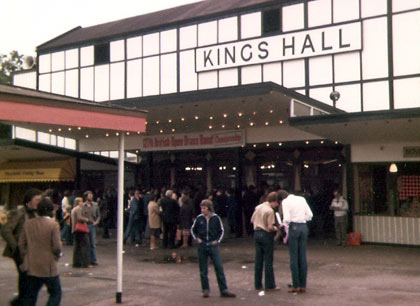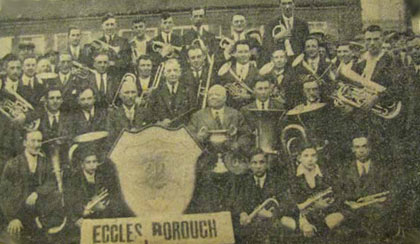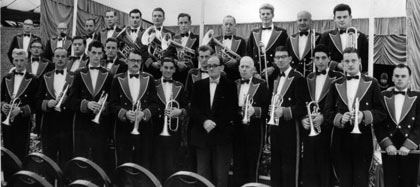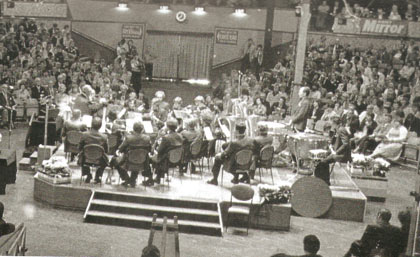2008 British Open Championships - Belle Vue - Thanks for the memory!
3-Sep-2008If children in the Manchester years ago had been given one wish they surely would have asked for a day at Belle Vue. A magic kingdom long before Disney got hold of the title. Tim Mutum recalls that it was home to brass bands as well as lions and tigers...
Manchester had grown considerably in the 1830s, being well located to benefit from the Industrial Revolution and this urban growth created a demand for entertainment.
The Zoological Gardens, Belle Vue, Hyde Road, Manchester, grew from a need to bridge the two extremes of entertainment that existed -one for the wealthy and the other for the lower classes.
Large numbers
Thus in 1836 the Belle Vue Pleasure Gardens were opened by John Jennison to provide a sophisticated and decent quality attraction for the better off, yet inexpensive enough to draw large numbers of the less well off.
Brass bands arrived in 1853, after Jennison's visit to the Great Exhibition caused him to review his attitude to music in the gardens. Although Enderby Jackson claimed the credit, generally it is acknowledged that Jennison was encouraged to consider the band contest by one James Melling, the conductor of the City Royal Brass Band.
The story of the first Belle Vue contest has been well documented. Suffice it to say here that eight bands entered with a total of 100 performers and 16,000 people turned up to hear Mossley Band win, with Dewsbury, Bramley Temperance and Bury Bands taking the next three places.
July Contest
In 1886 a July contest was introduced, restricted to bands who had not won a prize in the September contest during the previous four years. Attendances were smaller than for the September contest but success for a band meant an automatic invitation to that event.
In 1907 the competition rules were tightened. Bands winning the contest three years in a row were barred the following year but received a gold medal instead. Band members also had to live within four miles of the town where the band was based. Further rules covered professional players and transfers between bands.
The following year the Upper Norwood Band from London competed in the July contest in uniform, the first time this had happened.
Kings Hall

Venue of legends - The Kings Hall in the 1970s
For many Belle Vue is synonymous with the Kings Hall. This was built in 1910 in six weeks and its name commemorated the two kings in whose reign it was constructed. In the same year the July contest was split into three sections and a new contest for beginners was started in the May.
In 1922 a Junior section was added to the May contest and this is now acknowledged as being the start of the May Brass Band Festival. It was also the year that Besses o' th' Barn played in concert formation at the September event as opposed to the customary square, a change universally followed within a few years.
John Henrey Iles
The Jennison family finally sold out in 1925 to Belle Vue (Manchester) Ltd, which was controlled by John Henry Iles. Bands greeted this with relief. Apprehension had been rife for years over the future of banding at the venue. lles immediately began commissioning new music, the first piece being Macbeth by Thomas Keighley.
A restructuring of the band contests for May and July took place in 1931. The spring event became four classes (A-D) and in 1939 it became the May Championship Festivals but still with four classes.
First Open

Eccles Borough Band with a young James Scott - 1935
The abiding memory of James Scott is his very first Belle Vue in September 1935. He was just 10 years old. "My band was Eccles Borough, conducted by my then teacher, Clifton Jones, a famous name of the day who had been principal cornet of lrwell Springs, and was later principal for a while of Bickershaw.
The test piece was Thomas Keighley's 'Northern Rhapsody', and the contest was won by Black Dyke." Was James Scott the youngest player ever to have played at the September Belle Vue? "I have often wondered," he said, "I suppose I must be one of only a few -if any -alive who played at the 1935 September Belle Vue."
Cancelled
The outbreak of the second world war caused the cancellation of the 1939 September contest. Eventually it was held on the 30th of that month, but transport difficulties led to a reduced audience and to an early finish. Only eight of the 23 bands entered actually played. The July contests ended in 1940 mainly because of the war and the problems bands had with sufficient players.
In April 1942 a Grand Festival of Massed Bands and Choirs was held on behalf of Mrs Churchill's Aid to Russia Fund. Black Dyke Mills, Fodens, Faireys and Besses took part. Following the end of the war the September event was held as usual but at the end of that month the lower section finals of the Daily Herald National Finals also took place at Belle Vue.
A solo brass championship was held in August 1946 organised by the Daily Herald. At the suggestion of George Bernard Shaw several old instruments were played by experts. Jack Mackintosh played the slide trumpet, Alex Mortimer the ophicleide and Harry Mortimer performed Handel's aria '0 Ruddier than the Cherry' on a keyed bugle.
Bram Gay
Bram Gay recalls the 1940s vividly and in 1944 made his only playing appearance with ICI Alkali conducted by Fred Mortimer. "There were eight of Fodens in that band. We got nothing. Fred hated conducting there, and Fodens never competed in his time." Fred Mortimer didn't mind competing with the bands, but he drew the line at the elephants and 'Bob's Racer', both of which were audible all day.
Bram recalls that it was a strange place in which to play, especially before they abolished the boxing ring. "The hall was quite dark, and it seemed to go back for miles," he said. "Six thousand people in there sometimes, and 5,900 smoking -or so it seemed."
Spring Brass Festival
From 1952 the May Festival became the Spring Brass Band Festival with six sections, Grand Shield, Senior Cup, Senior Trophy, Junior Shield, Junior Cup and Junior Trophy.
Geoffrey Whitham, a former peerless euphonium player with Black Dyke Mills Band, recalls that in the late 1940s the bands used to leave their equipment under a tree. "Black Dyke had a tree and Foden's had a tree. In those days we used to travel in full dress and so it was just a case of taking the instruments out of the cases and leaving the cases under our tree. It was not so great when it rained."
Decline

One of the Open greats - CWS (Manchester) and Alex Mortimer
In 1962 Belle Vue (Manchester) Ltd, became solely owned by Forte Holdings Ltd, and by 1972, although the business was still owned by Forte, Belle Vue traded under the name of Entam Leisure Ltd. The 70s saw a decline in attendances at the main contest and the site was beginning to look a bit dated but as the decade continued there was an upturn of interest and in 1975 the best attendance since 1947 was recorded.
This was the year of Fireworks and the famous outcry of 'rubbish' as the composer Elgar Howarth left the box after the event ended at around 7.30pm. Interestingly, Howarth had visited Belle Vue as far back as 1943 where he heard his first Beethoven in the Denis Wright arrangement of the 'Fifth Symphony'. The 70s also saw Belle Vue staging the Granada Band of the Year contest.
Zoo closure
The famous zoo closed in 1977 and in 1980 the owners discussed with the local authority planners the alternative uses of the vast site -a mix of housing and industry being the outcome. In January 1981 the sale of the site was announced, although Trust House Forte (as they were then known) continued to use the Kings Hall until the end of the 1981/82 circus season.
The last September Belle Vue contest was held in 1981 with City of Coventry being declared the winners.
The National Brass Band Registry, which had been housed at Belle Vue, was taken over by local enthusiasts, including the late Ethel Behan, and financed by Harry Mortimer who had been responsible for securing the contests at Belle Vue in the last few years of the life of the site.
Demolition

Towards the end: Besses play at Belle Vue under Roy Newsome in 1981
Early in February 1982 Epsley Tyson, who had bought Belle Vue, agreed to delay the demolition of the Kings Hall by two weeks to let the NWBBA contest take place due to a fire at the normal venue of Bolton Town Hall. 56 bands took part, Dobcross Silver, conducted by Les Beevers, won on Force of Destiny and were the last band to give a contest performance in the Kings Hall!
Glossop School Band played 'Auld Lang Syne' and after the contest Harry Mortimer conducted a short concert with Besses as a final tribute to the Kings Hall. 'Life Divine' was the last piece and HM described it as a "most moving experience".
Last event
The last brass band event at Belle Vue was the Spring Festival on May 15, 1982. It was held in a strange landscape of half demolished buildings and weed-cracked concrete.
There were only two sections -the Grand Shield and the Senior Cup -both of which were held in the Cumberland Hall with refreshments in the Windermere Suite. Brodsworth Colliery was the final winners of the Grand Shield at Belle Vue.
The contest of John Jennison survives and so, I suppose, does his dream of pleasure grounds. I'm sure he would be impressed with the Open at Symphony Hall and Nemesis at Alton Towers!
Tim Mutum















